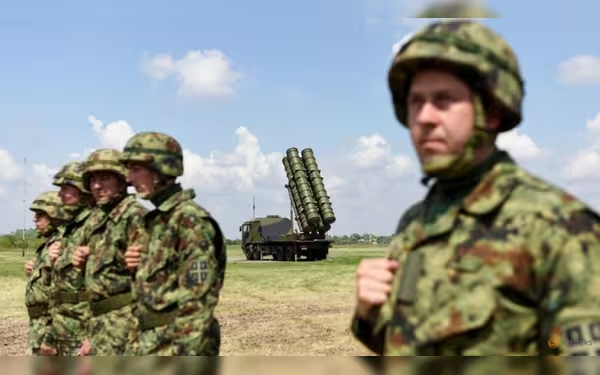Saturday, November 16, 2024 03:21 PM
Serbia Reintroduces Compulsory Military Service
- Serbia reinstates military conscription after 14 years.
- President Vucic emphasizes defense readiness, not aggression.
- Regional security dynamics prompt military strategy shifts.
 Image Credits: channelnewsasia
Image Credits: channelnewsasiaSerbia's government reintroduces compulsory military service to enhance defense capabilities amid evolving regional security dynamics.
In a significant policy shift, Serbia's government has decided to reintroduce compulsory military service, a measure that was abolished 14 years ago. This decision, announced by President Aleksandar Vucic, is seen as a crucial step towards enhancing the country's defense capabilities. The move comes at a time when regional security dynamics are evolving, and Serbia aims to bolster its military readiness.
The new plan entails that Serbian men will undergo 60 days of training followed by 15 days of exercises. Interestingly, military service will remain voluntary for women. This initiative has sparked a debate among military experts, with some expressing concerns about the financial implications and the effectiveness of such a brief training period in truly strengthening the nation's defense forces.
Serbia's armed forces transitioned to a fully professional model in 2011, yet they continue to face challenges related to low pay and inadequate equipment. The country, which is a candidate for European Union membership, has maintained a system of voluntary service and reserve units. President Vucic emphasized that the intention behind reintroducing conscription is not to provoke aggression but to deter potential threats.
This decision aligns with a similar move by neighboring Croatia, a NATO member, which announced plans to reinstate compulsory conscription starting January 1, 2025. Both countries are navigating a complex security landscape, and their military strategies appear to be converging, raising questions about regional stability.
Serbia has historically maintained a stance of military neutrality, having joined NATO's Partnership for Peace program in 2006. In a notable shift away from its traditional ally, Russia, Serbia recently signed a landmark agreement with France's Dassault Aviation to purchase 12 Rafale fighter jets. This acquisition reflects a broader trend in the region, as Croatia has also procured the same number of Rafale jets, indicating a potential arms race between the two nations.
As Serbia and Croatia enhance their military capabilities, it is essential to consider the implications for regional peace and security. While strengthening defense forces is crucial, it is equally important for both countries to engage in dialogue and cooperation to prevent misunderstandings that could lead to conflict. The reintroduction of compulsory military service in Serbia may be a step towards readiness, but it should also serve as a reminder of the need for diplomatic efforts in a region still healing from past conflicts.













